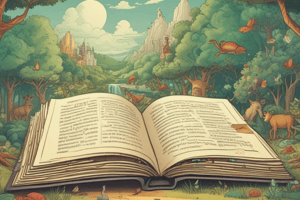Podcast
Questions and Answers
Define linear multimedia and its main characteristics.
Define linear multimedia and its main characteristics.
Linear multimedia is a type of multimedia that is designed to be presented in a sequential manner. It has a distinct beginning and end, and it follows a logical flow from a starting point to a conclusion. Its main goals include entertaining, transmitting knowledge, and making people familiar with a certain topic without any form of diversion.
Explain non-linear multimedia and its main characteristics.
Explain non-linear multimedia and its main characteristics.
Non-linear multimedia is a non-sequential type of multimedia where the person's participation is crucial. Users control the delivery of elements, deciding what and when the elements are delivered. They have the ability to move around or follow different paths through the information presentation, using interactions such as clicking, sliding, zooming, hovering, dragging, and flipping.
What are the main goals of linear multimedia?
What are the main goals of linear multimedia?
The main goals of linear multimedia are to entertain, transmit knowledge, and make people familiar with a certain topic without any form of diversion.
How does non-linear multimedia differ from linear multimedia?
How does non-linear multimedia differ from linear multimedia?
What are some examples of interactions used in non-linear multimedia?
What are some examples of interactions used in non-linear multimedia?
Flashcards are hidden until you start studying
Study Notes
Linear Multimedia
- A type of multimedia that presents information in a sequential and predetermined order
- The user has limited control over the presentation, and the flow of information is fixed
- Main characteristics:
- Predefined sequence of events
- Limited user interaction
- Passive user engagement
Non-Linear Multimedia
- A type of multimedia that allows users to navigate and interact with the content in a flexible and non-sequential manner
- Users have control over the flow of information and can choose their own path
- Main characteristics:
- Flexible navigation
- Multiple paths of information
- Active user engagement
Main Goals of Linear Multimedia
- To present information in a structured and organized manner
- To convey a specific message or tell a story
- To engage the user through a predetermined sequence of events
Differences between Linear and Non-Linear Multimedia
- Linear multimedia has a fixed sequence of events, while non-linear multimedia allows users to navigate freely
- Linear multimedia has limited user interaction, while non-linear multimedia encourages active user engagement
Examples of Interactions in Non-Linear Multimedia
- Clicking on hyperlinks to access related information
- Using menus to navigate through different sections
- Dragging and dropping objects to complete a task
- Responding to prompts or quizzes to progress through the content
Studying That Suits You
Use AI to generate personalized quizzes and flashcards to suit your learning preferences.




